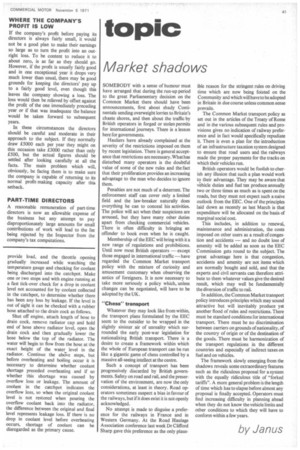topic
Page 43

If you've noticed an error in this article please click here to report it so we can fix it.
Market shadows
SOMEBODY with a sense of humour must have arranged that during the run-up period to the great Parliamentary decision on the Common Market there should have been announcements, first about shady Continentals sending overweight lorries to Britain's chaste shores, and then about the traffic by British operators in forged or stolen permits for international journeys. There is a lesson here for governments.
Hauliers have already complained at the severity of the restrictions imposed on them by recent legislation. There is general acceptance that restrictions are necessary. What has disturbed many operators is the doubtful value of some of the new rules and the fact that their proliferation provides an increasing advantage to the man who decides to ignore them.
Penalties are not much of a deterrent. The enforcement staff can cover only a limited field and the law-breaker naturally does everything he can to conceal his activities. The police will act when their suspicions are aroused, but they have many other duties apart from checking commercial vehicles. There is often difficulty in bringing an offender to book even when he is caught.
Membership of the EEC will bring with it a new range of regulations and prohibitions. Until now most British operators — except those engaged in international traffic have regarded the Common Market transport policy with the mixture of curiosity and amusement customary when observing the antics of foreigners. It is now necessary to take more seriously a policy which, unless changes can be negotiated, will have to be adopted by the UK.
"Chess" transport Whatever they may look like from within, the transport plans formulated by the EEC seem to the outsider to be wrapped in the slightly sinister, air of unreality which surrounded the early post-war legislation for nationalizing British transport. There is a desire to create a framework within which the whole of European transport can be run like a gigantic game of chess controlled by a massive all-seeing intellect at the centre.
Such a concept of transport has been progressively discarded by British governments. Safety on road and rail, and the preservation of the environment, are now the only considerations, at least in theory. Road operators sometimes suspect a bias in favour of the railways, but if it does exist it is not openly acknowledged.
No attempt is made to disguise a preference for the railways in France and in Western Germany. At the Road Haulage Association conference last week Dr Clifford Sharp gave this preference as the only plans
ible reason for the stringent rules on driving time which are now being foisted on the Community and which will have to be adopted in Britain in due course unless common sense prevails.
The Common Market transport policy as set out in the articles of the Treaty of Rome and in the various subsequent rules and provisions gives no indication of railway preference and in fact would specifically repudiate it. There is even a plan for the introduction of an infrastructure taxation system designed to ensure that road users and the railways made the proper payments for the tracks on which their vehicles run.
British operators would be foolish to cherish any illusion that such a plan would work to their advantage. They may be aware that vehicle duties and fuel tax produce annually two or three times as much as is spent on the roads, but they must not expect such a naive outlook from the EEC. One of the principles laid down as recently as last March is that expenditure will be allocated on the basis of marginal social cost_ This includes, in addition to renewal, maintenance and administration, the costs imposed on other users as a result of congestion and accidents — and no doubt loss of amenity will be added as soon as the EEC Commission gets round to the subject. The great advantage here is that congestion, accidents and amenity are not items which are normally bought and sold, and that the experts and civil servants can therefore attribute to them whatever values give the desired result, which may well be fundamentally the diversion of traffic to rail.
In addition, the Common Market transport policy introduces principles which may sound attractive but will inevitably produce yet another flood of rules and restrictions. There must be standard conditions for international transport. There must be no discrimination between carriers on grounds of nationality, of the country of origin or of the destination of the goods. There must be harmonization of the transport regulations in the different countries and especially of indirect taxes on fuel and on vehicles.
The framework slowly emerging from the shadows reveals some extraordinary features such as the ridiculous proposal for a system with the equally ridiculous title of "forked tariffs". A more general problem is the length of time which has to elapse before almost any proposal is finally accepted. Operators must find increasing difficulty in planning ahead when they do not know the vehicle limits and other conditions to which they will have to conform within a few years.




































































































































































